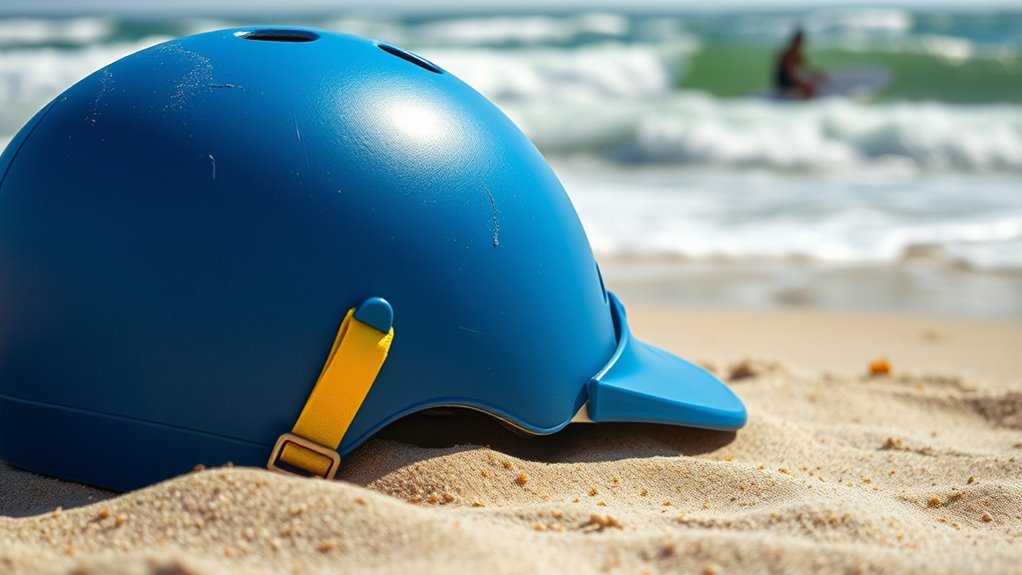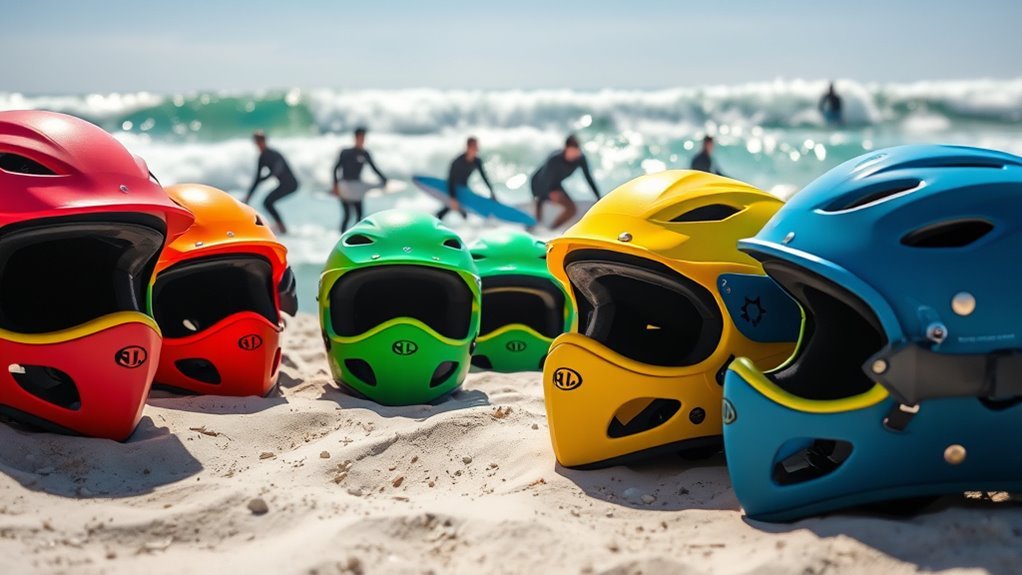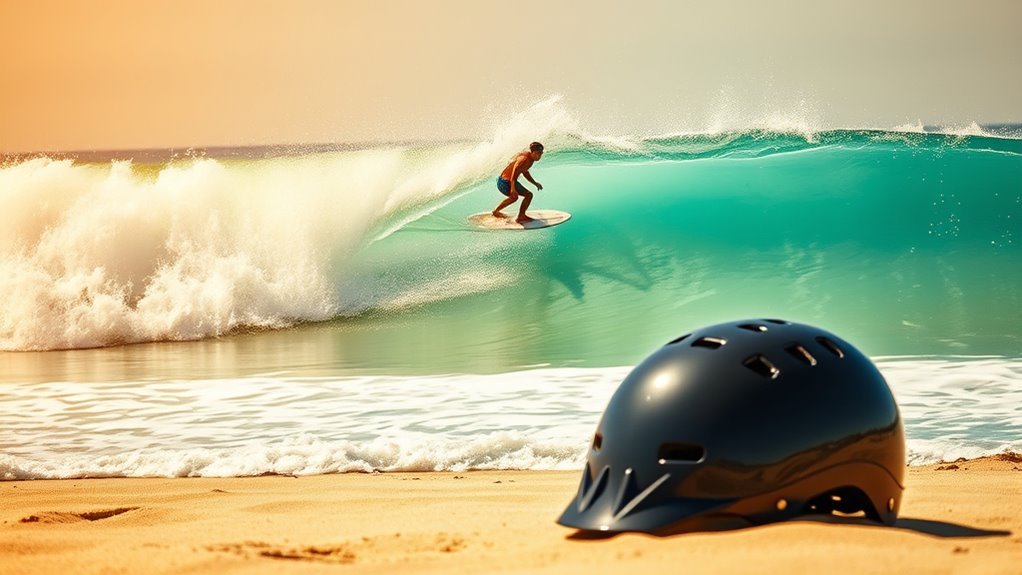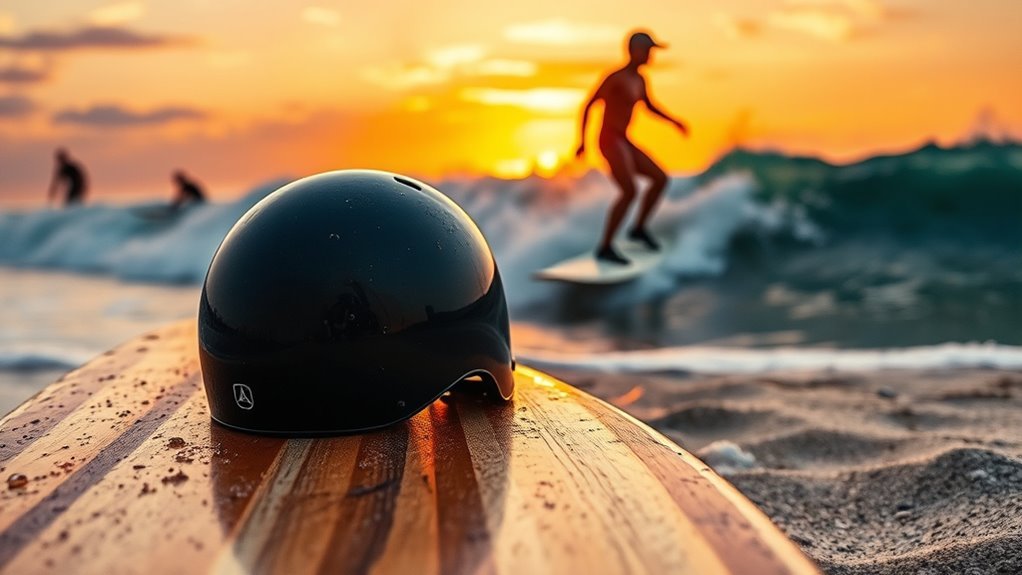Surf Helmets – Do You Really Need One?
When you’re surfing, you really can’t underestimate the importance of safety. Wearing a helmet greatly reduces the risk of head injuries from collisions and wipeouts. It’s essential gear, especially in high-risk situations like large waves or crowded spots. Without one, you’re exposing yourself to serious accidents that could ruin your surfing experience. So, if you want to enjoy surfing for years to come, it’s worth considering a helmet. There’s more to explore about choosing the right one for your needs.
The Importance of Safety in Surfing

When you hit the waves, it’s easy to get swept away by the thrill of the ride, but prioritizing safety should always come first. Surfing safety isn’t just about knowing the ocean; it’s about protecting yourself from potential hazards. Wearing a helmet can considerably reduce the risk of head injuries from falls or collisions with your board or other surfers. While it might feel like an extra layer, the helmet benefits far outweigh any discomfort. It allows you to ride with more confidence, knowing you’re taking precautions against unforeseen accidents. So, before you paddle out, consider your safety gear as essential, not optional. Embrace the freedom of surfing, but do so with the awareness that safety can enhance your experience.
Benefits of Wearing a Surf Helmet

While surfing is exhilarating, the benefits of wearing a surf helmet can’t be overlooked. A helmet provides essential impact resistance, protecting your head from potential injuries caused by sudden falls or collisions with the board or ocean floor. This added layer of safety allows you to push your limits without compromising your well-being. Additionally, modern surf helmets are designed for a comfort fit, ensuring they stay securely in place without restricting your movement. You’ll find that they often feature ventilation systems, keeping you cool even during intense sessions. Ultimately, wearing a surf helmet enhances your surfing experience, giving you the confidence to ride those waves while minimizing risks. Embrace freedom on the water, but do so with the protection you need.
Potential Risks of Surfing Without a Helmet

Surfing without a helmet exposes you to significant risks that can lead to severe injuries. In the heat of the moment, it’s easy to underestimate the dangers lurking beneath the waves. Water hazards like rocks, reefs, or even other surfers can cause unexpected collisions, resulting in head injuries that might change your life forever. A sudden wipeout can send you crashing into the ocean floor, where the impact could be devastating. While you might crave that sense of freedom, it’s essential to recognize that the thrill of surfing comes with responsibilities. Protecting your head isn’t just about safety; it’s about ensuring you can continue to enjoy the surf for years to come. Don’t let a moment of recklessness define your surfing journey.
When to Consider Wearing a Surf Helmet
Have you ever considered the conditions that might warrant a surf helmet? Knowing when to wear one can enhance your safety in challenging environments. Here’s a quick guide:
| Surf Conditions | When to Wear a Helmet |
|---|---|
| Large, powerful waves | Always, especially in impact zones |
| Shallow reefs or rocks | Definitely, for head protection |
| Crowded surf spots | Yes, to avoid collisions |
| High-performance surfing | Consider it, to mitigate risks |
In these scenarios, the risk of head injury increases considerably. A surf helmet can be your best ally against unexpected impacts, ensuring you enjoy the freedom of riding waves without compromising your safety. Stay informed and surf smart!
Choosing the Right Surf Helmet for Your Needs
How do you choose the right surf helmet that meets your specific needs? First, consider material selection. Look for helmets made from durable materials like ABS or polycarbonate, which provide impact resistance while keeping weight manageable. Next, make certain fit adjustment is a priority; a snug helmet can prevent movement during wipeouts, offering better protection. Many helmets come with adjustable straps or padding, so you can customize the fit to your head shape. Remember, comfort is key—an uncomfortable helmet could hinder your surfing experience. Finally, check for ventilation features to keep you cool while riding. Prioritize safety without sacrificing your freedom in the waves. Choosing wisely can enhance your performance and peace of mind.
Frequently Asked Questions
Are Surf Helmets Comfortable to Wear for Long Periods?
Surf helmets can be comfortable for long sessions, but it really depends on the fit and design. You’ll want to make sure it’s snug yet not too tight, as comfort level varies among different models. Look for features like ventilation and lightweight materials, which can enhance your experience. Remember, while freedom’s essential, so is protection, so finding a balance between comfort and safety is key for those extended days on the water.
Can I Use a Regular Helmet Instead of a Surf Helmet?
You can’t just swap a regular helmet for a surf helmet without risking safety. Regular helmets lack the specific safety standards required for water sports, which are designed to absorb impacts and protect your head in a unique environment. Different helmet types serve distinct purposes; a surf helmet’s design caters to water conditions, offering features like drainage and a secure fit. So, if you value your freedom to ride waves, invest in the right gear.
How Do I Properly Fit a Surf Helmet?
To properly fit a surf helmet, start with the right size; it should snugly fit your head without causing discomfort. Adjust the straps to guarantee it doesn’t move when you shake your head. Make sure the helmet sits level on your head, covering your forehead. Check for proper sizing by trying it on with any accessories like ear pads. Remember, a secure fit is vital for your safety while enjoying the waves.
Do Surf Helmets Affect My Hearing While Surfing?
Wearing a surf helmet can feel like donning a protective shield in a storm, but it might dampen your sound clarity. While it offers essential hearing protection, you might notice a muffled world around you, which could impact your awareness of the surf or fellow surfers. If you value freedom in the water, remember that staying aware is key, so choose a helmet designed to balance safety with sound transmission.
Are There Surf Helmets Specifically Designed for Children?
Yes, there are surf helmets specifically designed for children. These helmets prioritize children’s safety, featuring lightweight materials and adjustable straps for a secure fit. Look for models with additional padding and ventilation to keep them comfortable while surfing. It’s important to verify that the helmet meets safety standards, as this can greatly reduce the risk of injury. Encouraging your child to wear their helmet can help them enjoy the waves with greater confidence and freedom.
References
- https://www.ncbi.nlm.nih.gov/pmc/articles/PMC6339486/
- https://www.who.int/news-room/fact-sheets/detail/injuries-and-violence
- https://www.cdc.gov/headsup/basics/index.html
- https://www.surfertoday.com/surfing/surf-helmets-are-they-worth-it
- https://www.bbc.com/news/uk-51139608
- https://www.surfer.com/features/surf-helmet-safety/






